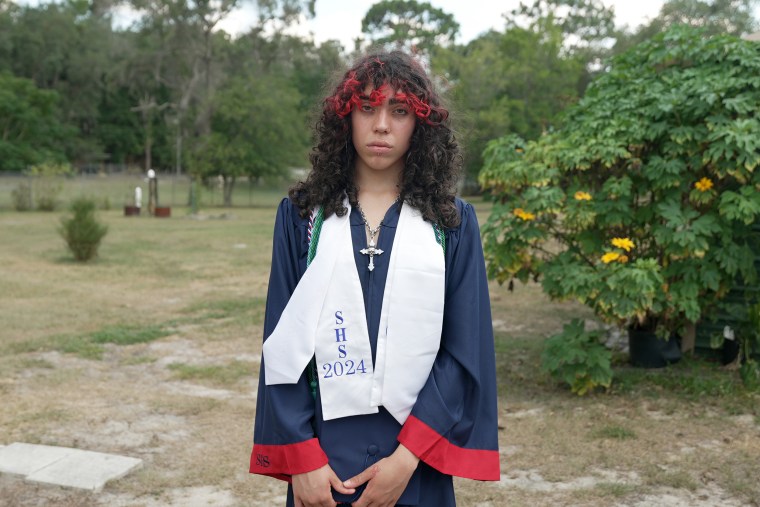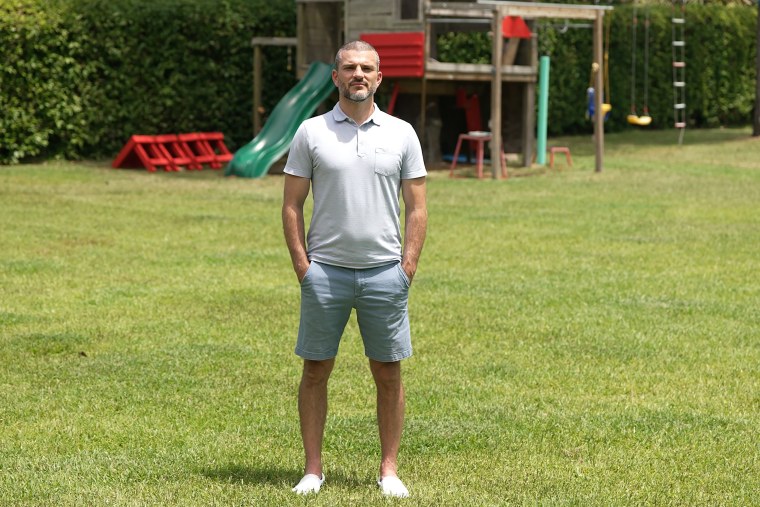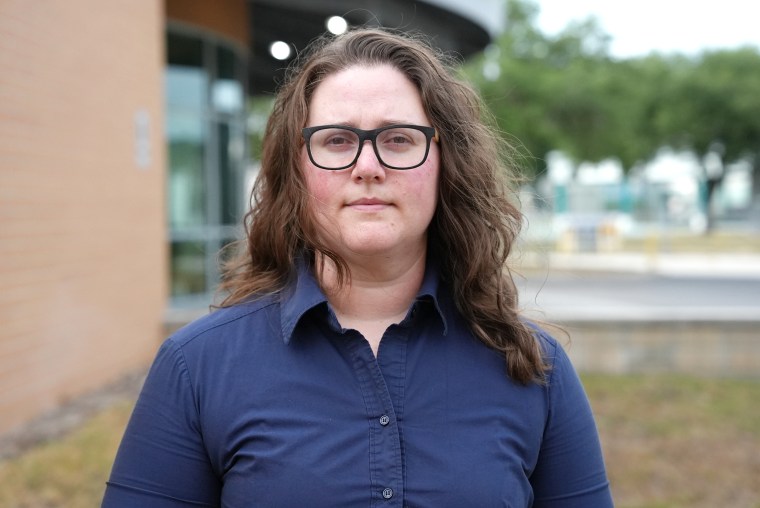For Florida’s LGBTQ teens and teachers, the law is a moving target
Aiden Cordero, 18, was suspended from her Florida high school in February for using the girls’ bathroom.
Cordero is a transgender girl and a senior at Frank W. Springstead High School, in a suburb of Tampa, where, she said, she’s been using the girls’ restroom for the last three years without issues. However, one of a few laws targeting LGBTQ students or topics Republican Gov. Ron DeSantis signed in May 2023 requires that she use either the boys’ restroom or the single-occupancy restroom in the school’s clinic, which she said is far from her classes.
In February, she had an emergency, so she went to the nearest bathroom, which was the women’s restroom, she said. When she returned to class, she said, two classmates told an administrator she had used the girls’ restroom, and she was suspended for the day.
As a result of her suspension, Cordero said, she wasn’t allowed to join the rest of her classmates on a senior trip, which she had paid $180 for. Before the incident, Cordero was considering staying in Florida for college, because she was awarded a Bright Futures Scholarship, which would have paid partial tuition at an in-state university. Due to her experiences in high school, as well as the passage of state legislation targeting LGBTQ rights, she decided to leave Florida and attend college in New York, even though doing so would mean additional expenses.
“I feel like if I went to college [in Florida], I would have to face that for four more years. If I stayed in a dorm out here, I have to be in a male dorm, using male bathrooms,” she said, referring to a Florida Board of Education rule implemented last year that broadened the May 2023 law.
A spokesperson for the Hernando County School District declined to comment on Cordero’s suspension, citing student privacy.

NBC News spoke with Cordero and other students, teachers and parents in Hernando County throughout the most recent school year about effects of laws targeting the LGBTQ community, including what critics have dubbed the “Don’t Say Gay” law, which was expanded in May 2023.DeSantis signed the first version of the law, the Parental Rights in Education act, in May 2022. The original law prohibited “classroom instruction by school personnel or third parties on sexual orientation or gender identity” in kindergarten through third grade “or in a manner that is not age-appropriate or developmentally appropriate for students in accordance with state standards.”
The expanded measure prohibits sexual orientation or gender identity instruction in prekindergarten through eighth grade, restricts reproductive health education in sixth through 12th grade and requires that reproductive health instruction “be age-appropriate or developmentally appropriate for students in accordance with state standards.” The law applies to both public and charter schools.
Recommended

OUT NEWSAfter 32 years as a progressive voice for LGBTQ Jews, Rabbi Sharon Kleinbaum heads into retirement

OUT POP CULTUREFormer late night host Amber Ruffin comes out on last day of Pride Month
The LGBTQ students and teachers who spoke with NBC News said the resulting climate has been one of confusion about what exactly violates the law and increased hostility toward anything LGBTQ-related.
Hernando County School District Superintendent John Stratton sent out an email in May 2023 that said teachers should familiarize themselves with the Parental Rights in Education law, according to a copy of the email shared with NBC News. He sent another email shortly thereafter, which was also shared with NBC News, that directed school staff members not to “display any items that can be considered classroom instruction on sexual orientation or gender identity (flags, posters, stickers, etc.).”

Ian Wald, a digital cinema production teacher at Nature Coast Technical High School in Brooksville, about 50 miles north of Tampa, said he removed a rainbow sticker that was behind his desk at the end of the 2022-23 school year, shortly after Stratton’s email was sent out.“I wasn’t trying to convert anybody; I was just trying to let students know that they were safe in my classroom,” said Wald, who doesn’t identify as LGBTQ.
However, teachers who are a part of the LGBTQ community, like Alyssa Marano, said the expanded law made them feel they had to hide who they are. Marano, who was also a teacher at Nature Coast, left her job at the end of the 2022-23 school year because of the political climate surrounding LGBTQ issues in Hernando County and at the state level and got a job as a marketing manager at a local gym.
After having missed the first half of the school year, she returned to the classroom in January.
“When I decided to leave at the end of last year, there were so many emotions, and it was really just a heavy time,” she said. “So I had to put it down.” Now, she added, she’s picking her teaching career back up, hopeful that it will be “a little lighter.”

In March, Florida education officials and civil rights attorneys reached a settlement in a lawsuit challenging the parental rights law that allows students and teachers to speak freely about sexual orientation and gender identity in Florida classrooms as long as it’s not a part of class instruction. The settlement will also allow schools to create anti-bullying policies related to sexual orientation and gender identity and create LGBTQ clubs, such as gender-sexuality alliances. In April, a judge in a separate lawsuit temporarily blocked the restriction on teachers’ use of pronouns that don’t align with their birth sexes. However, that injunction blocks enforcement of the law only against two of the teachers who sued.The settlement doesn’t affect the part of the parental rights law that bars teachers from using names and pronouns for students that don’t align with their sexes assigned at birth or the law restricting trans students’ bathroom use.
Florida has also passed a number of other bills targeting trans youth, including one that restricts trans students’ participation in school sports. Several of the state’s LGBTQ-related bills, however, have been temporarily or permanently blocked in court, including a measure that restricted gender-affirming care for minors and adults, which a judge largely struck down this month. In an emailed statement, DeSantis’ deputy press secretary said the governor’s office plans to appeal the ruling.
Some Floridians have moved out of the state or considered moving as a result of the so-called Don’t Say Gay law. In a report published in January, before the law was expanded, the Williams Institute at UCLA School of Law found that 56% of 133 LGBTQ parents surveyed in Florida said they had considered moving out of the state because of the measure. Another Williams Institute report, which was conducted in March 2023, when the bill’s expansion was being debated, surveyed 106 Florida parents, both LGBTQ and non-LGBTQ, and found 40% said they had considered moving out of the state as a result of the law.
Jon Harris Maurer, the public policy director at Equality Florida, an LGBTQ advocacy group founded in 1997, said that this year the organization heard concerns from more parents and families than ever before.
“Families were afraid to send their children to school because protections had been eliminated, bullying was on the rise, and teachers were being forced back into the closet,” he said. “On top of that, school districts were telling teachers to remove ‘safe space’ stickers and to strip books off the classroom and library shelves.”
School board members from one-third of school districts in the state, representing the majority of Florida’s student population, also reached out to Equality Florida during the 2023-24 school year to say their districts had struggled to interpret the laws and that the state is “refusing to clarify them, amplifying confusion and fear,” Harris Maurer said.
Cordero, who graduated in May and decided to pursue college in New York City, said that though New York isn’t perfectly safe, she hopes to be able to live her “best life” there.
“I’m able to use the women’s bathrooms, I’m going to be able to stay in women’s dorms — just be myself basically,” she said. “When I’m in New York, I’m going to be free.”